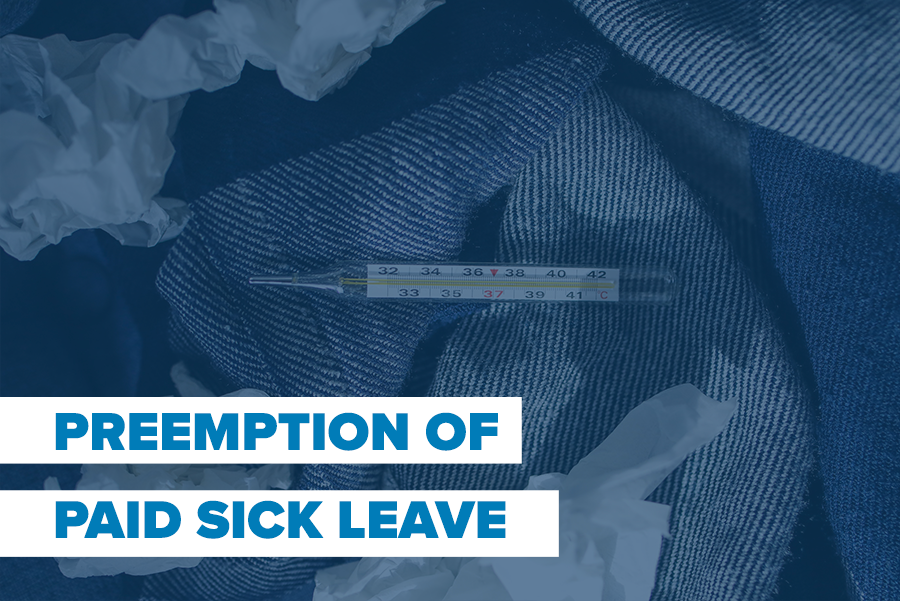Preemption of Paid Sick Leave
This is the latest in a series of LSSC toolkits aimed at providing a one-stop-shop for all of the messaging, media, legal, and research resources associated with individual issue areas that are commonly preempted. Click here to view them all.
This document was last updated in April 2022.
Messaging 101
None of us should be forced to choose between taking care of a loved one or losing our jobs -- but that’s exactly what too many people had to do during the pandemic.
It’s a decision that can have significant consequences – for a worker, for a family, and for a community.
It’s understandable that many cities and states want to provide paid sick leave for workers. It’s a commonsense policy that protects workers, customers, and economies, and allows people to put their families first.
Americans from all walks of life - and all political affiliations - overwhelmingly support paid sick leave policies. A 2020 poll found that 82 percent of Americans support paid sick leave, including 72 percent of Republicans and 79 percent of Independents.
Despite this overwhelming support - and the clear need for paid sick leave policies - many state legislatures have made it illegal for local governments to adopt these measures in recent years.
Efforts to preempt paid sick leave measures disproportionately harm BIPOC workers, immigrants, women, and others working in low-wage industries.
Consider what’s happened in Texas. Dallas’ locally passed paid sick leave measure was actually in effect before a Texas court invalidated the law -- removing paid sick leave from workers as the pandemic took hold. Forty-one percent of workers in Dallas now lack access to paid leave.
The ruling similarly froze planned paid sick leave measures in Austin and San Antonio.
50 percent of Hispanic workers in Texas lack paid sick leave, as do 37 percent of Black workers
Fourteen states, the District of Columbia, and dozens of cities have passed paid sick leave protections. Here are some of the reasons why these measures are so important:
Employees forced to work when sick aren’t at their most efficient - and this costs the economy an estimated $234 billion a year.
Employers could save roughly $1.8 billion annually by providing paid sick leave; a figure based on the reduced potential for spreading flu-like symptoms and illnesses via sick employees who have no choice but to come to work.
Paid sick leave keeps our overall health costs lower -- employees without access to leave are 2.5 times more likely to use emergency room services for sick kids or loved ones.
These policies also keep our kids healthier. Parents without paid leave are twice as likely to send their kids to school when sick -- putting other children and teachers at risk.
Media Examples
Despite the Pandemic, Republicans Are Fighting Paid Sick Leave All Over the Country | Jacobin, 2/16/21
Commentary: Rep. Smith: Stop Tallahassee preemption to save earned sick time | Orlando Sentinel, 7/29/20
Opinion: Dallas gave workers paid sick leave. Don't let Austin take that away | Dallas Morning News, 5/14/19
Legal Resources
An interactive overview of paid sick time laws in the United States | A Better Balance
Paid Sick Leave Is Good For Business | A Better Balance
Model Law: Establishing a Permanent Right to Paid Sick and Safe Time that Includes Additional Leave for a Public Health Emergency (2020) | A Better Balance
Model Law: Establishing Paid Sick Time Leave for a Public Health Emergency (2020) | A Better Balance
Research Resources
Paid Sick Days: What Does the Research Tell Us About the Effectiveness of Local Action? | Urban Institute, January 2019
For All of Us, By All of Us: Challenging State Interference to Advance Gender and Racial Justice | Partnership for Working Families, May 2019
Work sick or lose pay? | Economic Policy Institute, June 2017

